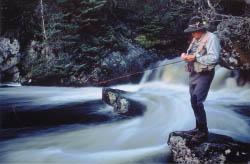Abandon the Sport?

By Chris Marshall
Jack Imhof's conservation feature in this issue (page 46) makes the case for
fly fishers to get actively involved in community-based fishery management
initiatives on local rivers and lakes, in order to create and maintaine sustainable
fisheries. For this to happen, the more fly fishers there are to get involved
the better - the greater our number, the stronger our voice.
However, there's a problem: while we have considerable success in recruiting
new fly fishers, the drop-out rate among these is huge. A 1996 study
(Response Management for the North American Fly Tackle Trade Association
and the American Sportfishing Association) indicates that the majority of new
fly fishers appear to abandon the sport within five years of taking it up.
I suspect that there are a number of reasons for this, but a major one is that many
of them fail to develop their skills sufficiently to be successful. Unlike golf, fly
fishing has little in the way of high-profile infrastructure for instruction and
encouragement. Sure, there are fly fishing clubs and schools, but fly fishing tends
to be a solitary sport. Golf, on the other hand, is a social activity, where novices
get to play along with more experienced players whom they can watch and
emulate. Consequently, many novice fly fishers tend to be left out in the cold to
become frustrated and discouraged.

This need not be so. Some clubs have excellent teaching and mentoring programmes
as well as extensive social fishing events. If these were more widespread, it would
do much to help novices grow and stay with the sport. As individuals we can also
help, by taking novices (especially youngsters) under our wing. Even if each of
us volunteered only a couple of trips in which we shared our expertise, it would
make a significant difference in encouraging more novices to become successful
enough to fly solo and stick with the sport.
Although we might dreeam of fishing in pristine solitude, the fact is that most of
us spend the bulk of our time on home waters in relatively easy reach of urban
centres. To protect and sustain these, the more fly fishers who utilise them and
cherish them, the better. If we work harder at nuturing new fly fishers as well
as recruiting them, we'll all end up winners, for successful and confident, they
will be more inclined to metamorphose into full-fledged fly fishers, to stand
with us as keepers of our streams. ~ Chris Marshall
|



